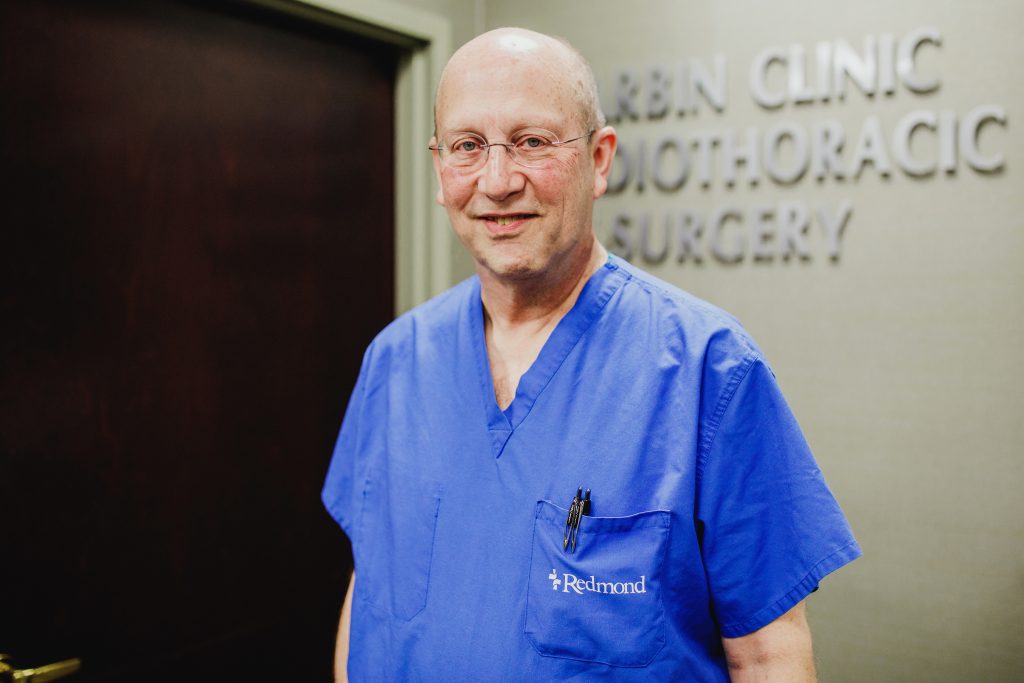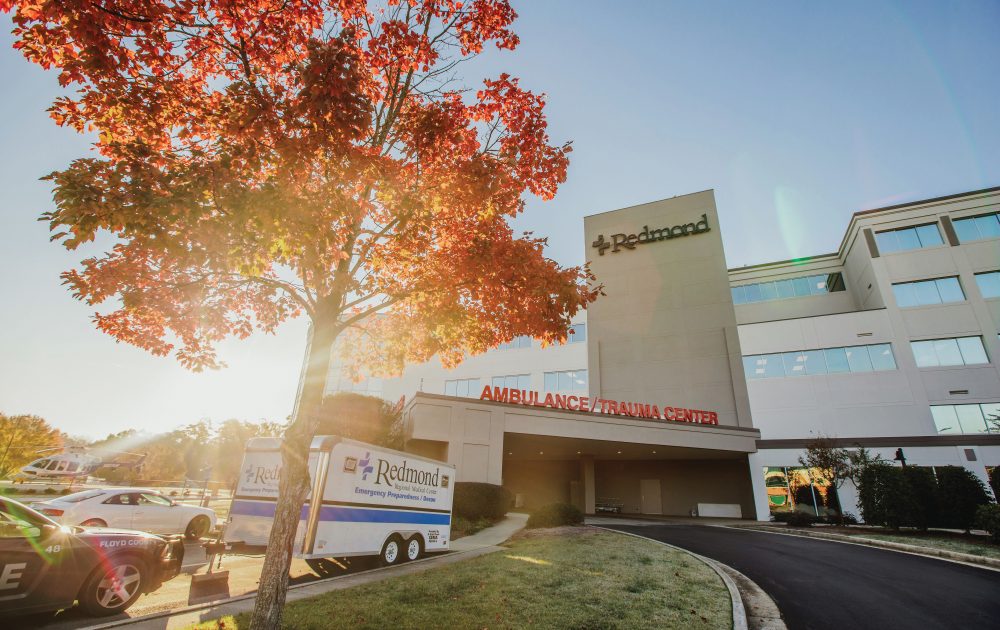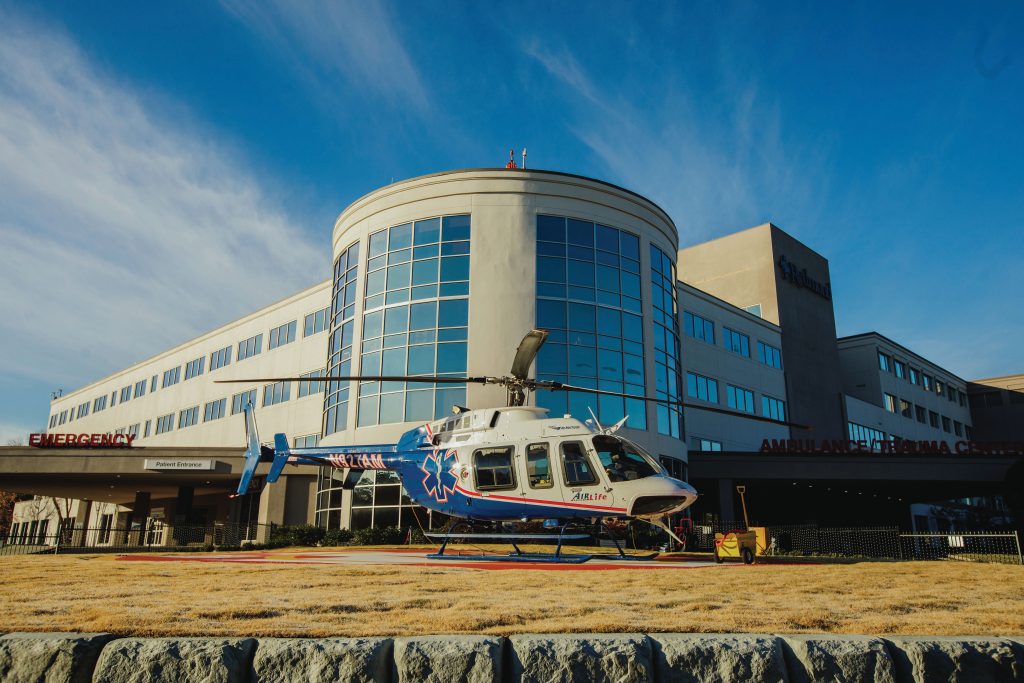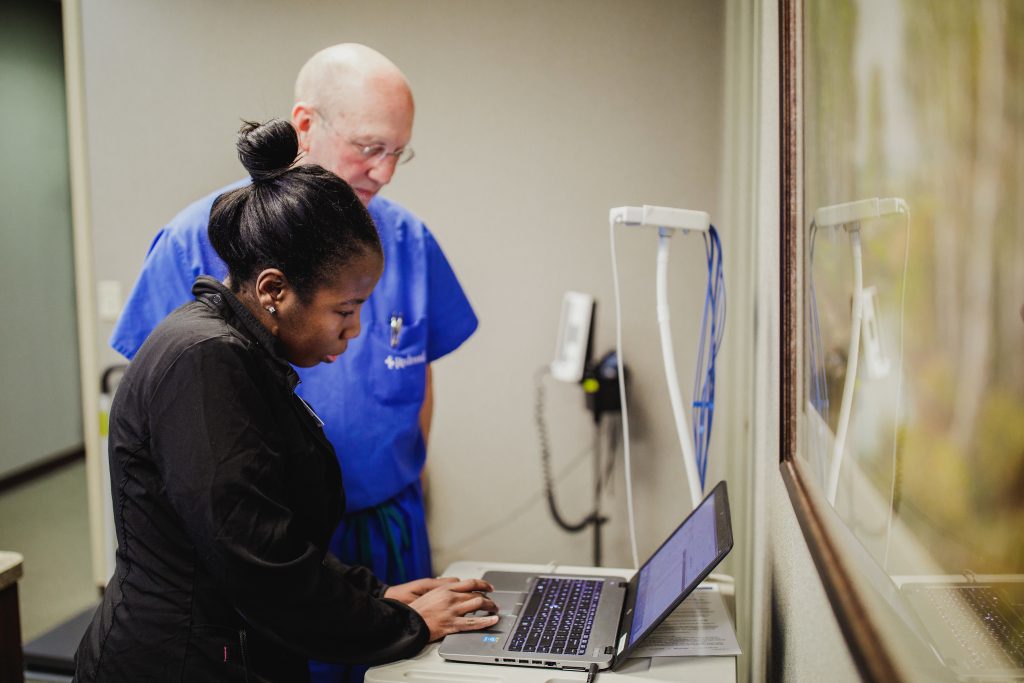
Photos Cameron Flaisch
We all know that the heart is a very important organ. Essentially, the heart is what keeps us alive by serving as the engine behind a complex delivery system: our bodies.
Someone even thought the heart was important enough to dedicate an entire month to the awareness of its health, as February is also known as American Heart Month.
Here in Rome, we are fortunate enough to have several of the best heart care facilities and knowledgeable physicians who educate themselves about the latest treatment options in cardiac medicine. For an area of practice that is vital to ensuring we have a healthy and thriving community, it is great to know our physicians take extra special care of the patients they serve.
One of Rome’s most celebrated cardiothoracic surgeons has made it his life-long duty to serve the residents of Floyd County and beyond in order to keep their motor running smoothly and efficiently.
Dr. Daniel Goldfaden, Physician at Harbin Clinic and Cardiothoracic Surgeon at Redmond Regional Medical Center has been fine tuning this vital muscle for patients in Rome since the very beginning, totaling almost 32 years.
Born in 1951 in Detroit, Mich., Dr. Goldfaden knew the only thing he wouldn’t grow up to be was a doctor.
“Growing up, my dad was a general practitioner,” explains Dr. Goldfaden. “He had been in WWII as a pharmacist. He enlisted as a private but ended up loving medicine instead. When he got out, he went back to medical school and transitioned into general practice where he delivered babies, performed minor surgery, saw patients in the office, etc.”
Watching his father spend long nights at the office, having little to no free time and witnessing just how hard he had to work, he decided that was not the path he would like to pursue.
“When I went to college, I knew the only thing I wouldn’t do was medicine. That was not for me,” says Dr. Goldfaden.
Of course, things change. “By the time I got to my third year of college, I decided that medicine was the best option for me. I completely flip flopped,” laughs Dr. Goldfaden.
Dr. Goldfaden attended the University of Michigan for undergraduate, which is also where he completed medical school a few more years down the road.
Unlike his decision to not study medicine, he knew as soon as he entered medical school that he wanted to study cardiology.
“When I got into medical school, I already kind of knew and had somewhat of an interest in cardiac medicine,” says Dr. Goldfaden. “I focused mainly on cardiology and cardiac surgery and applied to both programs because I wasn’t sure if I wanted to practice internal medicine or surgery.
“I ended up really liking the surgery aspects of cardiology and next thing I knew, seven years later, I had finished my training,” says Dr. Goldfaden.
During his residency, Dr. Goldfaden met John Kirkland, who was from Rome and who was doing his
Surgery Residency at the University of Michigan as well.
“Dr. Kirkland had become a great friend of mine, even taking care of me when I had appendicitis,” explains Dr. Goldfaden. “We got to know each other pretty well.
“When I was training, I was planning on going into academic medicine and practice at a University Hospital someplace, whether it be Michigan or another school,” continues Dr. Goldfaden.
“The year I was finishing my training, Dr. Kirkland moved to Rome to start the vascular surgery program. He and the hospital had spearheaded an effort to get a cardiac surgery program started here, and he wanted to know if I would be interested in moving. I remember saying, ‘Not me, I’m going into academics.’ But, as a favor to him, I went ahead and visited Rome, and was pleasantly surprised.”
For a small town in the South which, according to Dr. Goldfaden, “was probably the last place on earth I would ever move to,” he really loved Rome. What peaked his interest further was the great medical community that already existed, even in 1984.

“Even though I liked the town a lot, I didn’t do it. There were too many things that, at the time, I didn’t want to give up, so I ended up moving to Chicago, Illinois at the University of Illinois at Chicago where I started academic practice for around two years,” says Dr. Goldfaden.
Even though Dr. Goldfaden turned down the initial offer, his love for cardiology and wanting to see a program flourish and thrive pushed him to help come up with plans for the vascular surgery unit in Rome such as, how to set up the operating room, what equipment to purchase, medical guidelines and more.
While working in Chicago, Dr. Goldfaden got a call from Dr. Kirkland about the certificate of need from the state, and how it did not come through as they had hoped it would. They received the certificate two years later, prompting Dr. Kirkland to call Dr. Goldfaden and see if he was dead set on academia.
“‘Are you interested?’” Dr. Goldfaden remembers being asked by his good friend and mentor.
“I still wasn’t convinced, but I decided to travel down to Rome again, and this time they kind of put the full-court press on,” jokes Dr. Goldfaden. “I also brought my wife down with me. She fell in love with the town, and essentially decided we were moving here. That was in 1986,” says Dr. Goldfaden.
When he and his family moved to Rome, he was working at Redmond performing heart surgeries by himself.
“At first, I wasn’t exactly sure how much practice there would be here,” explains Dr. Goldfaden. “I thought if we did at least 100 cases a year, that would be enough to make a pretty good living. The first year, we started off in around October or November and within a couple months, I was doing around five or six cases a week. That was way more than I expected. That amount of work would put me at about 200 to 250 cases a year,” recalls Dr. Goldfaden.
Because of the surprising work load, he started looking for a partner pretty quickly. “I hired my first partner after a year and then our third about three years after that; so, it has been about three of us since the beginning,” explains Dr. Goldfaden.
At Redmond, Dr. Goldfaden and his team do about 450 open heart surgeries a year. They also do general thoracic cases, pulmonary/ lung cases and some trauma cases as well. And if you count those, the number rises closer to 700-750.
“It’s a demanding schedule,” says Dr. Goldfaden, “but it’s a field where you can really help people, so it’s worth it.
“Cardiac surgery is a lot of plumbing and mechanical things that you can fix or replace. It’s a gratifying specialty, and even to this day, I still enjoy it. I love my patients and the fact that it is intellectually challenging, and rewarding is great. But it’s a lot of work,” smiles Dr. Goldfaden when talking about his day-to-day.
As one can bet, Dr. Goldfaden’s schedule doesn’t differ much from his father’s, which perhaps comes along with being a doctor of any sort. Between the three cardiac surgeons, Dr. Goldfaden and his team have to cover 365 days a year, therefore leaving one of them on call for 24 hours every third day, year in and year out, which is a big-time commitment.
“Most days, I am in the hospital around 6:30 or 7:00 a.m. doing my rounds on my patients who are in the ICU (Intensive Care Unit),” explains Dr. Goldfaden. “I then go to the operating room. Most heart operations take about four to five hours. If I do two a day, that’s eight hours in surgery, plus doing rounds and everything else added. It tends to be long days, so you’re looking at 12 to 16 hours per day.”
Even though medicine has changed dramatically in the 32 years that Dr. Goldfaden has practiced in Rome, the one thing that hasn’t changed is his love for the heart.
“Nothing in life is perfect, and there are somethings that you miss working as much as I do. However, it has been a great specialty and Rome has been a great place to raise a family, has a great medical community, good support from the community and hospitals and more,” says Dr. Goldfaden. “I wouldn’t change anything.”
In fact, his most successful memory is simply being a part of the whole cardiology/ cardiac surgery practice at Redmond and simply keeping it going for thirty-plus years.
“There are a lot of small towns that have started programs like ours and haven’t succeeded,” says Dr. Goldfaden. “We have kept this place going and have remained state-of-the-art for thirty years. I think that is my most successful feat. And it’s not just me, it’s the whole team. Just being a part of it is rewarding.”
In his spare time, Dr. Goldfaden and his wife love to bike.
“During the summer, we usually go out three of four times a week and ride around 10 to 12 miles. We also love to hike. Of course, raising three kids was another job, but now have grandkids that we get to enjoy,” smiles Dr. Goldfaden.
Northwest Georgia is very lucky to have a family member and friend like Dr. Daniel Goldfaden. This month, lets join in on the celebration of all doctors who deal in matters of the heart and their love for the place they have called home for so long.





